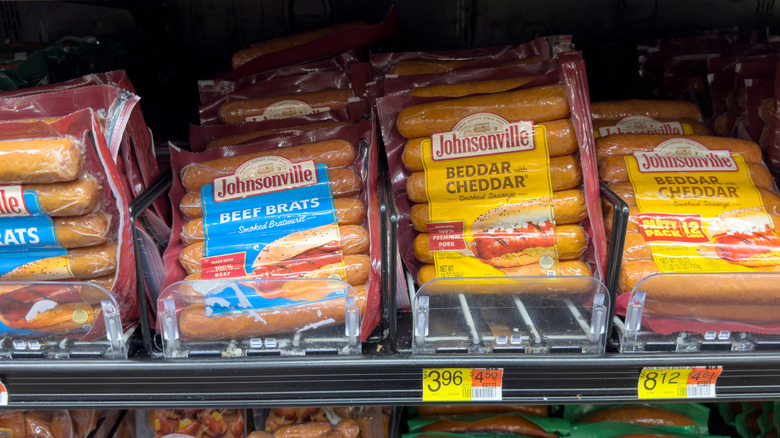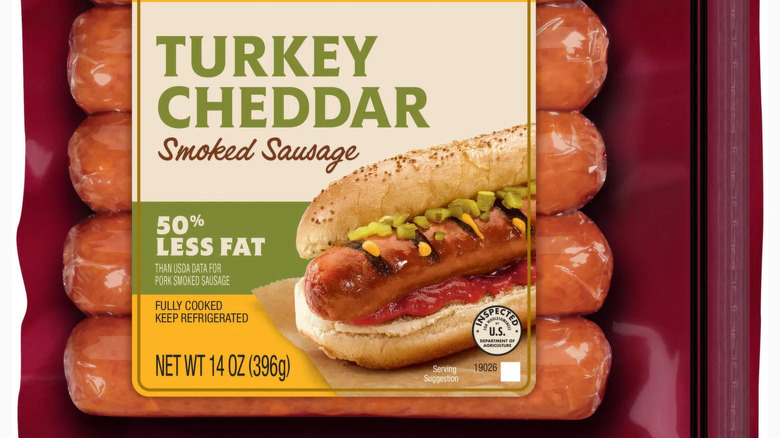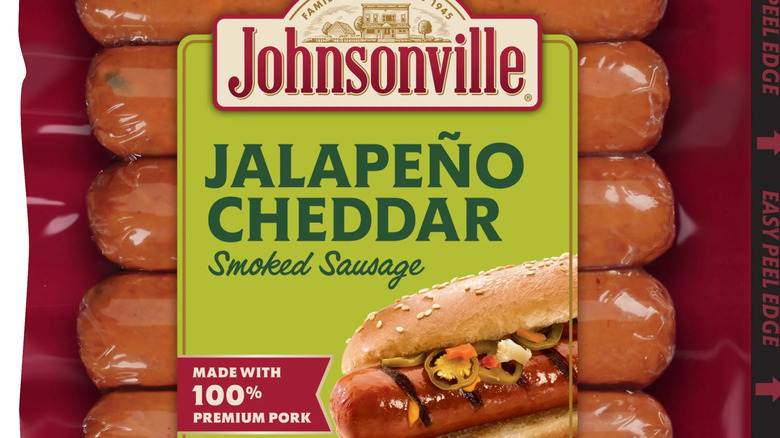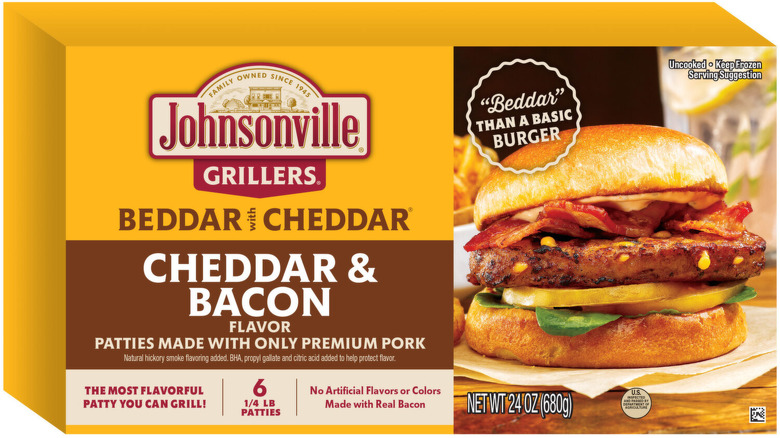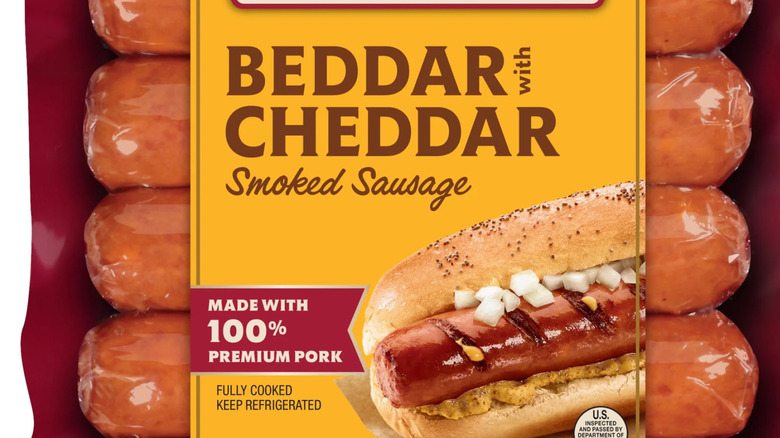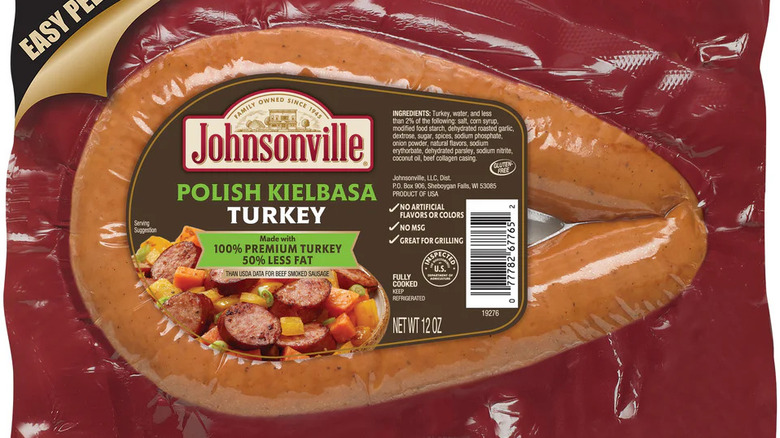The Biggest Food Recalls In Johnsonville History
Johnsonville is a classic All-American brand known for its succulent sausages. Starting as a humble family-owned butcher shop in 1945, the brand has worked long and hard to not only call itself "most popular brand of sausage in the United States," but to be available in 45 countries internationally. It has definitely become one of the most popular and highest ranked sausages. The brand prides itself on remaining family-owned all of these years later despite the massive operation it has grown into.
Johnsonville is raking in massive cash making more than $ 1 billion in annual revenue. It's popularity landed Johnsonville brats on the McDonald's menu in Wisonsin. In 2024 Johnsonville acquired another Wisconsin sausage and hot dog manufacturer, Salm Brothers, increasing the brand's output and further cementing its success. Although the brand prides itself on quality and integrity, it's not immune from slip ups. Johnsonville has issued a considerable number of recalls in the last decade or so and they may not be what you expect. When you hear about big meat recalls, you may think of listeria and salmonella, but when it comes to Johnsonville products, a different theme emerges.
August 2012: Turkey Sausage with Cheddar Cheese
The first instance of a Johnsonville recall on the Food Safety and Inspection Service (FSIS) website goes back to 2012. Forty-eight thousand pounds of turkey sausage were recalled by the company because they may have contained pieces of gloves. The last thing you would want when you're taking a big bite of your morning sausage is to bite into a chewy piece of a manufacturer's glove. It only took two reports from customers for the company to recall every package that may have come from the same batch, identified by the establishment number "EST. P-34224."
A small mistake on the production line can cause the quality of sausages across the country to come into question. The FSIS classified this foreign object contamination to be a "Class II" risk indicating if you were to be unfortunate enough to eat one of these glove sausages you may have negative health effects, but the effects would be medically reversible. There are three classes of recall with a "Class I" recall being the most dangerous and a "Class III" recall being the least concerning. This recall was issued swiftly and there are no wide reports of consumers being injured by this rubber glove incident.
March 2018: Jalapeño Cheddar Smoked Pork Sausage
It would be six years before Johnsonville pulled another one of its frozen sausages from shelves. Despite the time between the incidents, the cause of the recall is very similar to the last. Johnsonville's Jalapeño Cheddar Sausages were found to have hard green plastic pieces inside of the sausages. Imagine thinking you're about to get a mouthful of crunchy spicy jalapeño, only to find what you thought was a pepper, is plastic.
The brand recalled 109,603 pounds of the pork sausages as a result of the contamination, making this the largest recall in the brand's history. It only took three customer complaints to recall the whole batch. The FSIS reported that no injuries or medical consequences were reported in relation to the recall. Although there were no dire consequences, the outcome could have been much worse. This was a Class I recall meaning that this green plastic could have caused serious medical problems for anyone unlucky enough to have consumed it.
January 2019: Johnsonville Grillers Cheddar Cheese and Bacon
The next product to be struck by a foreign contaminate was not a sausage, but raw pork patties. The Cheddar Cheese and Bacon flavored Grillers were recalled due to chunks of black rubber being found in the product — mixed in with the savory bacon and chunks of cheese. (Hopefully anyone that purchased these patties noticed the curious smell of burning rubber coming from their grill before they decided to take a bite.)
In early 2019, over 48,000 pounds of pork Grillers were recalled across the nation. Three customers reported this to Johnsonville and thankfully, the company caught it early. Eating rubber would certainly lead to medical issues. These rubber filled patties were classified a Class I high risk recall. Despite the risk, luckily no injuries were reported. These patties were manufactured on three separate days, the first day being September 27 and the other days were two consecutive days over two weeks later on October 17 and 18. This seems bizarre if this was caused by the same manufacturing error, but no further information about the contamination was shared by the brand.
June 2023: Beddar with Cheddar Ready-to-eat Pork Sausage Links
Beddar with Cheddar smoked pork sausages were the next Johnsonville recall culprit. The sausage links were found to contain really thin black plastic strands. Due to the fact that these sausages are ready to eat from the package, this contamination might have been hard for consumers to catch in their minimal prep time.
The 42,062 pounds of sausages recalled were all from the same batch sharing the same best by date. Only one consumer called to complain about this contamination but that was all it took for Johnsonville to issue a full recall. The small plastic strands did not pose a huge threat to sausage fans, the recall was a Class II low risk recall. The brand received no reports of injuries or adverse effects in relation to the plastic. Despite the low risk, we're sure a thin plastic strand in your cheddary bite of sausage will ruin anyone's day.
March 2024: Polish Kielbasa Turkey Sausage
In 2024 there was a repeat appearance of rubber pieces found in the brand's sausages. The Polish Kielbasa Turkey Sausage was found to contain pieces of rubber without much description of what the rubber looked like. When reaching to make a simple skillet kielbasa dinner, you might want to be cautious.
It is unclear how many reports of rubber pieces the firm received, but it seems several customers called to report this contamination. Over 35,000 pounds were recalled in total with all of the sausages being made between October 30 and 31. This high risk Class I recall means that consumers should think twice and check their freezers before eating Johnsonville kielbasa. No injuries were reported in association with this contamination. Johnsonville seems to swiftly recall its products, minimizing harm to customers. You would think a brand this long-standing would have more recalls, but it seems contamination is a recent trend in the brand's history.
